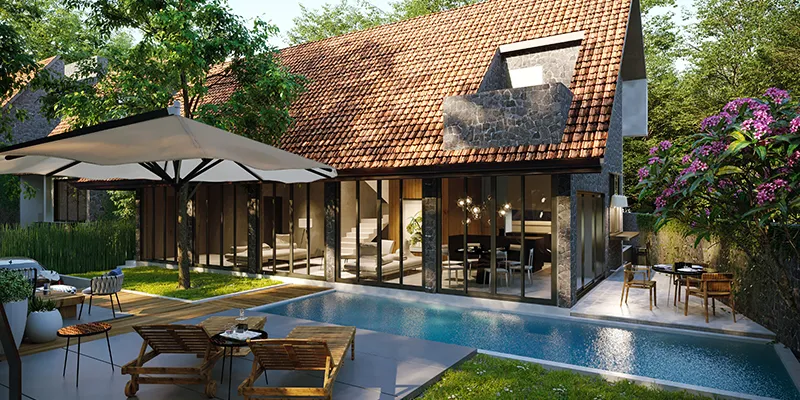How two sisters homed in on an opportunity that combines houses and tourism in Goa
Real estate startup Kasu Assets builds, sells, and manages holiday homes in Goa. Apart from maintenance, housekeeping, and concierge services, it helps homeowners to rent out properties via Airbnb so they can earn a rental income when the homes are unused.
Sisters Dhruthi Kasu Reddy and Jyotsna Kasu Reddy began their careers working for their father’s startup. In 2012, the siblings worked with Musion India, which used 3D holographic projection technology to create live and pre-recorded holograms of people and objects on stage.
Kasu Rajgopal Reddy’s client list included Narendra Modi, the then Chief Minister of Gujarat, who used 3D technology during his election campaigns and went on to become Prime Minister of India. Despite that success story, the sisters soon realised that building 3D campaigns and having one stellar client wasn’t going to cut it.
In 2015, during one of their frequent holidays to Goa, Dhruthi and Jyotsna realised that the state was witnessing a new clientele who wanted to own a second home but were under served. These people were looking at buying a property in Goa as a holiday home or as an investment.
Watch the sisters in conversation with YourStory Business Editor Vishal Krishna:
Over the years, only the rich and famous have owned houses in Goa; most of these remained under lock and key through the year after the owners returned home. The homes, generally used after monsoons ended and before summer began, would literally be empty for nine months of the year.
Tapping an opportunity
Dhruthi and Jyotsna saw an opportunity to build and manage houses for the new rich (such an entrepreneur) who aspire to own homes with great designs but are looking to make the asset churn some profits while not in use. They chalked out a plan to build and manage these houses through a real estate/hospitality company for the rest of the year by entertaining global travellers keen to stay in super-luxurious properties.

Dhruthi and Jyotsna hope to change the way people own homes in Goa
These properties, all in Goa, would be listed on AirBnB and opened up to high-profile tourists. The assets, managed by Kasu Assets like a hospitality service, ensure rental income for the owners. Even when the owners return, they do not have to worry about food or cleaning up the house as the startup would provide end-to-end services
The sisters founded Kasu Assets in February 2017. The name of the firm was a given – apart from being their family name, it means “money” in Telugu, Kannada, and Tamil. Their father, who hailed from a real estate business family, lent his experience to guide them.
Why did they move away from the 3D business? Jyotsna Reddy, Co-founder of Kasu Assets, who also continues to run Musion India, says:
“Dhruthi and I were (and to an extent, still are) very involved in the 3D business in terms of execution, sales, and administration. But it taught us about the Indian market and mindset and how different it is from more evolved western markets. Since we were bringing this technology to India for the first time, we couldn’t bring western business models to this very price-sensitive market. In the 3D business, we learnt a lot about the balance between product and price, not to mention the various unlawful copycats that pop up once something is successful."
Getting started
However, it was not easy for two women from Bengaluru to set up shop in Goa, especially in the real estate segment. While Goa became a part of India in 1961, all title deeds continued with their legacy of being Portuguese. It was not the male-dominated real estate sector that bothered them as much as understanding the ancestral laws of Goa did. They had to create a local legal team to understand title deeds written in Portuguese.
The sisters began by purchasing land to build houses, and Dhruthi, an architect by profession, decided to up the ante with the design philosophy. She roped in famed architect Sameep Padora, and each villa they built in the property, named Vana, had its own private pool and gardens. The four-bedroom homes were built with locally procured high-quality laterite stone and had full-height glass windows set into angled facades, consciously allowing for natural light.
“Each site is unique and we draw inspiration from the geographical features, manmade features, and, of course, the programme itself. We realise that one goes on vacation to cut off, be closer to nature, to entertain and unwind. The spaces we design should be conducive to this,” Dhruthi says.
As soon as the first property began to take shape in 2017, the duo began to build Zama in Anjuna, which has 14 villas. This project began in March 2018 and will be complete by 2020. So far, two units of Vana and seven units of Zama have been sold.
Meanwhile, Dhruthi and Jyotsna have signed up two more properties to develop. They have financed each property themselves and are not looking for external funding as of now.

Kasu Vana costs upwards of $500,000
The business model
Kasu’s business model is not just about an outright sell. The startup manages the property when the client returns home, and ensures that it never remains under lock and key. These properties are curated for the connoisseur traveller to live in, especially those keen to live in natural settings.
The startup prides itself on being an end-to-end service provider. “We provide clients with top-end products - vacation homes, and the all other services one needs to maintain and setup these homes. We have boutique interior packages, maintenance and housekeeping, concierge services, and rental management services all in-house. We want to make the experience of home ownership as simple, painless, and organised as possible. Bringing a hospitality-style service to a traditional industry like real estate is what truly differentiates us,” Jyotsna says.
A bright future
The co-founders did not disclose Kasu’s pricing to manage properties on an annual basis is not disclosed. However, each property owner pays more than $350,000 to own a villa.
“We are promoting these projects as second homes to homeowners. We expect each project to break even in five years,” Dhruthi says.

Kasu Assets Zama costs upwards of $300,000
According to IBEF, the real estate sector in India is expected to reach a market size of $1 trillion by 2030 from $120 billion in 2017, and contribute to 13 percent of the country’s GDP by 2025. Retail, hospitality, and commercial real estate are also growing significantly, providing much-needed infrastructure for India's growing needs.
With Goa being India’s busiest hotspot on the international tourism map, the company plans to focus on the sunshine state till 2022. However, the co-founders do not rule out expanding to other heritage markets soon. “We are unique because of our designs, but, what separates us is that we manage these properties for our clients completely,” says Dhruthi Reddy.



1552494935744.png?fm=png&auto=format&h=100&w=100&crop=entropy&fit=crop)







